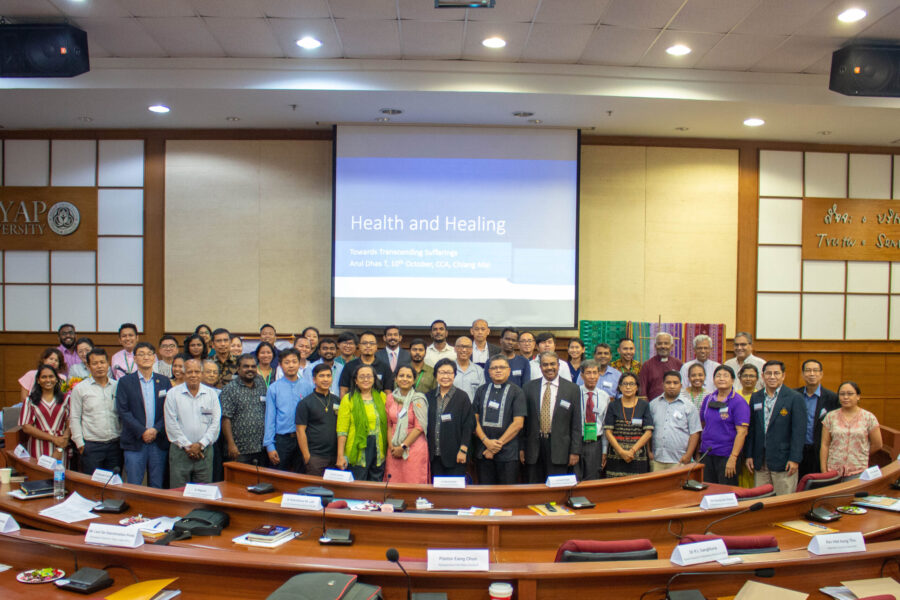Churches in Asia challenged to initiate new, innovative approaches to health and healing ministry
 Participants of the CCA's International Consultation on ‘Faith, Health, and Healing: Christian Response in Asia’
Participants of the CCA's International Consultation on ‘Faith, Health, and Healing: Christian Response in Asia’
Chiang Mai, Thailand: The international consultation on ‘Faith, Health and Healing: Christian Response in Contemporary Asia’, organised by the Christian Conference of Asia (CCA), began today, 10 October 2022, on the campus of Payap University in Chiang Mai, Thailand. About 60 participants including medical professionals, pastoral care providers, and leaders of churches, ecumenical councils, and health-related organisations as well as institutions from across Asia, are attending the consultation.
In his keynote address focusing on ‘Right to Health, Right to Life: Role of the Church in Developing Effective Health and Healing Ministry in Asia’, CCA General Secretary, Dr Mathews George Chunakara said, “The right to health extends beyond certain assumptions or notions that include a wide range of factors that can help to lead a healthy life.”
“The role of churches and the ecumenical movement in Asia is to be creative agents of the health and healing ministry, which is much more significant in today’s Asian situations. Vast populations in developing as well as developed countries in Asia require substantial care for their bodies and minds today,” added Dr Chunakara.
“There has been a marked decline in the ministry of health and healing services provided by Asian churches. The growing commercialisation in health care sectors distorts the original purpose of providing the health care services to the poor and needy. This trend has affected the sustainability of mission of the churches in health and healing ministry in several Asian countries. What we need to think about is how to initiate innovative programmes for motivating the churches in Asia to equip their hospitals to take the health and healing mission much more seriously,” said the CCA General Secretary.
Dr Chunakara also mentioned the theology of health, healing, and wholeness of life, which “reminds us of the value of spirituality that sustains our option for the poor, opens us to participate in alleviating the sufferings of all those who are around us, and calls for carrying out the task of accompanying the process.”
Dr Mathews George Chunakara further emphasised the need for churches and church-related health care institutions to develop new and innovative approaches that will make a concerted effort to accompany churches in Asia that are actively engaged in support of Christian health ministries.
The CCA General Secretary reminded the participants of Jesus’ compassionate response, which healed broken bodies and minds and broken community ties, and that Jesus calls on churches to attend to the bodies, minds, and community ties of all God's children.
“The Church in Asia is a minority community, but we cannot use this as an excuse for inaction or inefficiency in carrying out its health ministry. The healing ministry is about proclamation—the good news of health, wholeness, and salvation. It affirms Jesus Christ as the great healer and acknowledges a mandate given to all churches and every Christian to preach, teach, and heal,” Dr Chunakara stated emphatically at the end of his message.
Rev. T. Arul Dhas, head of the chaplaincy team at the Christian Medical College Vellore, India, in his theological reflection, said, “One way of transcending sufferings is accepting sufferings. The process of sharing and listening promotes healing, allowing us to move from suffering to healed and healthy relationships.”
Rev. Dhas also mentioned that pain could be a part of the healing process. With many years of experience in pastoral care and counselling in healthcare institutions and communities, he mentioned the Holy Eucharist and hospital services as channels that the church has used as an instrument of healing, even for those who are not Christian. Rev. Dhas pointed out that Jesus’ pain at the Last Supper could be visualised as “Jesus transforming the pain into a healed experience” as he broke bread and shared wine with the apostles.
Dr Alexander K. Ginting of the Persekutuan Gereja-gereja Indonesia (PGI) Health Foundation in Indonesia explained how church-related institutions collaborated with the Indonesian government to provide services to people. In advance of the possibility of emerging pandemics, he urged churches to prepare for biological and natural disasters.
Dr Sunita Abraham of the Christian Medical Association of India (CMAI) discussed the benefits and drawbacks of commercialising the Christian health ministry. She cited a study conducted in India that highlighted one of the consequences of the commercialisation of health care institutions in India as compromising mission goals by Christian mission hospitals, through the prioritisation of financial liabilities over social responsibility.
The three-day international Conference on Faith, Health, and Healing is being held from 10 to 12 October 2022.
The international conference will formulate and adopt an Ecumenical Declaration on Health, Healing, and the Right to Life as an outcome of the consultation’s deliberations.










